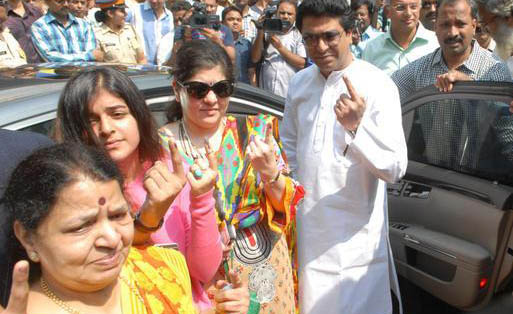New Delhi, Oct 16: Haryana witnessed an “all-time high” voter turnout in the Assembly elections held on Wednesday as the electors made a last-hour dash to seal the fate of a total of 1,351 candidates in the fray. Voting, however, was moderate in Maharashtra, where 4,110 candidates are facing a tough contest.

Of the total 1,61,58,117 voters, 76 per cent exercised their franchise at 16,320 polling stations in 90 Assembly constituencies spread over 21 districts of Haryana. In Maharashtra, the turnout was pegged at 64 per cent. Deputy Election Commissioner Sudhir Tripathi, describing the voter turnout as “moderate” in the state, said it was 54.5 per cent till 5 pm.
Haryana had witnessed 72.65 per cent voter turnout in 1968. In the last Assembly elections, the turnout was 68 per cent. In the 16th Lok Sabha elections in May, the state witnessed 71.86 per cent voters exercising their franchise.
A total of 288 Assembly seats in Maharashtra and 90 in Haryana went to polls. The counting of votes will be held on October 19.
As the voting closed, exit polls gave the BJP an edge in both Maharashtra and Haryana where Prime Minister Narendra Modi campaigned extensively. In Maharashtra, the BJP was miles ahead of its opponents, including its erstwhile ally Shiv Sena, though only one exit poll gave it an absolute majority.
Today’s Chanakya, which made accurate predictions during the Lok Sabha polls, gave the BJP 151 seats, six seats more than the majority mark of 145 seats, while Times Now-CVoter gave the party 129, ABP-Nielsen 127 and India-Today-Cicero 117-131. In Haryana too, the exit polls gave the BJP a lead with Today’s Chanakya predicting 52 seats in a house of 90, CVoter 37 and Nielsen 46. Stakes of the BJP were high in both the states.
According to the Election Commission, the polling passed off peacefully in both Maharashtra and Haryana, barring a few incidents of clashes. Maoists attacked a polling party and security forces at two different locations in Gadchiroli district. One Central Reserve Police Force (CRPF) personnel was wounded in an exchange of fire with Maoists which followed a claymore mine blast at Maskipalli in Chamorshi tehsil in Gadchiroli.
“The attacks did not affect polling. The injured CRPF jawan has been sent to Nagpur for treatment,” Tripathi said.
In Haryana, poll authorities had to replace 30 electronic voting machines (EVMs), 15 EVMs with Voter Verifiable Paper Audit Trail (VVPATs) following some technical glitches, the EC said.
Both the states witnessed a downpour of black money during elections. Director General, Election Commission, P K Dash said more than Rs 17.92 crore in cash, highest ever, was seized during elections in Maharashtra. The authorities also seized 4.61 lakh litres liquor worth Rs 10.19 crore.
In Haryana, Rs 3.10 crore was seized in cash during polls and over 1.82 lakh litres liquor worth Rs 2.69 crore.





Comments
Witajcie zaskakuje sie nas nieszkodliwa oczyszczalnia zlewów, rozporzadza ona slono walorów,
lecz najwazniejszym istnieje biezacy, iz troszczymy o srodowisko Czy gosc
przechodzi taka oczyszczalnie? Wydobyl badajaca stronke wzywam zbadajcie równiez wypowiedzcie sie na ten fakt Mówicie
My homepage: oczyszczanie
biologiczne scieków: http://www.xinshengerquming.com/comment/html/?1068.html&page=
Add new comment